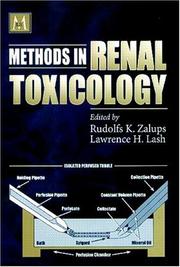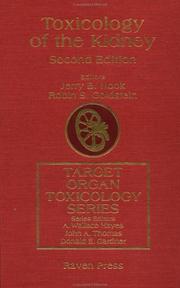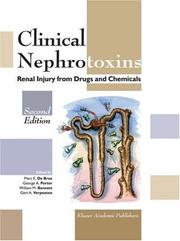| Listing 1 - 3 of 3 |
Sort by
|

ISBN: 0849333415 Year: 1996 Volume: *1 Publisher: Boca Raton CRC Press
Abstract | Keywords | Export | Availability | Bookmark
 Loading...
Loading...Choose an application
- Reference Manager
- EndNote
- RefWorks (Direct export to RefWorks)
Nefrology --- Nephrotoxicology --- Methodology --- Nephrotoxicology - Methodology. --- Kidney - physiology. --- Kidney - drug effects. --- Kidney Function Tests - methods. --- Toxicology - methods.

ISBN: 0881678856 Year: 1993 Publisher: New York Raven
Abstract | Keywords | Export | Availability | Bookmark
 Loading...
Loading...Choose an application
- Reference Manager
- EndNote
- RefWorks (Direct export to RefWorks)
Nefrology --- Nephrotoxicology. --- Kidney Diseases --- Kidney Function Tests. --- Kidney --- chemically induced. --- drug effects. --- Drug effects.

ISBN: 1402012772 9781402012778 9781402025860 1402025866 Year: 2003 Publisher: Dordrecht Kluwer
Abstract | Keywords | Export | Availability | Bookmark
 Loading...
Loading...Choose an application
- Reference Manager
- EndNote
- RefWorks (Direct export to RefWorks)
To you the reader, the joy of discovery begins, for We continue in our goal of providing a text which us the job is done. In this edition, we have corrected is useful, not only to the clinician, but of equal interest past deficiencies, added new topics, expanded infor- to the investigator. The selection of content has been mation regarding the pediatric age group, provided directed at topics of current interest rather than those up to date (March 2003) references, while remaining of historic contribution. We have stressed the cont- true to our concept of a multi-national author book. bution of cell biology and pathophysiology, were it We continue to believe that scientific information is an exists, believing it provides both a better understa- international commodity whose interpretation and ap- ing of toxic injury when known, and a rational dir- plication are strongly influenced by both the cultural tion for therapy and prevention. and ethnic background of the observer. The oppor- nity to share in the rich diversity of the international We are encouraged by the accumulation of rec- scientific community remains a fundamental goal of nized risk factors, which allow pre-treatment strati- this endeavor. To participate as equals leads to mu- cation of our patients’ relative risk and allow us to - tual respect and peer appreciation. The sharing of in- cus our preventative techniques on the individuals tellectual resources fostered by this effort should and most likely to gain the greatest benefit.
Nefrology --- Kidney --- Kidney Diseases --- Nephrotoxicology. --- Renal pharmacology. --- Néphrotoxicité --- drug effects. --- chemically induced. --- Internal medicine. --- Kidneys - Effect of drugs on. --- Medicine. --- Nephrology. --- Veterinary medicine. --- Nephrotoxicology --- Kidneys --- Urologic Diseases --- Urinary Tract --- Male Urogenital Diseases --- Female Urogenital Diseases --- Urogenital System --- Diseases --- Anatomy --- Female Urogenital Diseases and Pregnancy Complications --- Medicine --- Health & Biological Sciences --- Urology & Nephrology --- Effect of drugs on --- Public health. --- Medicine & Public Health. --- Veterinary Medicine. --- Internal Medicine. --- Public Health. --- Veterinary Medicine/Veterinary Science. --- Community health --- Health services --- Hygiene, Public --- Hygiene, Social --- Public health services --- Public hygiene --- Social hygiene --- Health --- Human services --- Biosecurity --- Health literacy --- Medicine, Preventive --- National health services --- Sanitation --- Medicine, Internal --- Farriery --- Large animal medicine --- Large animal veterinary medicine --- Livestock medicine --- Veterinary science --- Animal health --- Animals --- Domestic animals --- Livestock --- Internal medicine --- Losses --- drug effects --- chemically induced
| Listing 1 - 3 of 3 |
Sort by
|

 Search
Search Feedback
Feedback About UniCat
About UniCat  Help
Help News
News